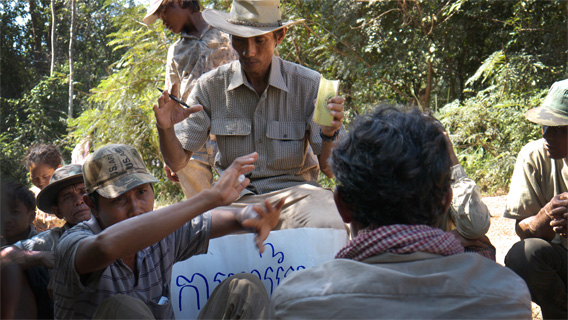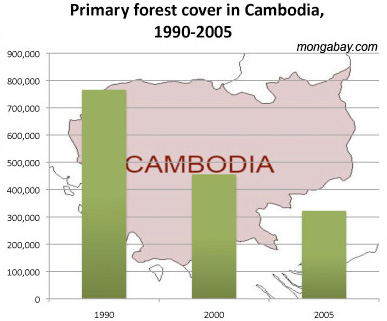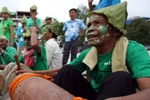
Chut Wutty with Prey Lang Network representatives, November 2011. Copyright Fran Lambrick 2011. All rights reserved.
Chut Wutty, a dedicated Cambodian activist, was shot dead at an illegal logging site by military police, on Thursday. At the time Wutty was driving with two journalists, who wrote a shocking eyewitness account of his death, revealing that he was physically and verbally abused, then shot whilst trying to drive away, and left to die. His death reveals the brutal power of logging syndicates and companies, which are looting the country’s natural wealth, and employing the military to silence their opponents.
Wutty was the director of the Natural Resources Protection Group. He was the most vociferous activist speaking out against illegal logging, particularly active in the Cardamom mountains and in Prey Lang forest. He played a major role supporting the Prey Lang Network, a grassroots forest protection movement that spans four provinces.
Local authorities and officials offer little support in the fight against illegal logging. As Wutty explained, “civil servants, in their uniform, have not performed their role according to their mandate. The only role they play is facilitating business deals to make personal profit. With this they earn from more than one source. First, they get their salary from government, second, they get direct income from selling timber, and third, they make money facilitating business deals.”
“I understand that wealth is important and I want to be wealthy as well. But I also want to see people live with freedom, to be able to maintain their culture, their traditions, to be able to pursue their own life style.”
Deforestation in Cambodia is driven by a juggernaut of powerful interests. Collusion between officials, concessionaires, logging syndicates and the military creates a powerful front. The number of land concessions in Cambodia is rapidly increasing: rubber, mining and dams are major causes of large-scale deforestation. Despite losing out on valuable timber revenue from illegal logging in concession areas, the Cambodian government aims to expand rubber plantations to 400,000 hectares by 2020. Forest dependent communities face losing their land and independence, becoming poorly paid laborers in plantations owned by the wealthy.

|
Few activists or NGOs have the courage to voice their concerns about this widespread dispossession. Wutty was perfectly aware of the risks he was taking but he was determined to speak out. Sitting next to him as the military approached at the Prey Lang protest in November, Wutty was composed. “They are coming to catch me; should I run away? But where to go?” He looked around for a second, then mildly commented, “Well, I’d like to see what they do.”
On Thursday, Wutty’s death showed just how far those people would go in the face of his courageous and untiring dedication to stop the destruction of Cambodia’s forests. It is a triumph that he kept pursuing justice in the face of threats and violence.
The question now is, who sent the soldiers to apprehend Wutty?
Human rights groups have launched inquiries pursuing precisely this question. Cambodian Centre for Human Rights president Ou Virak said yesterday that his organization had strong leads on which company asked the military police to stop Chut Wutty.
The truth may not come out immediately, but a full investigation should now be launched. The Cambodian government must be pushed to control the illegal logging and land-grabbing in Cambodia, that involve an oppression and violence revealed so tragically by Wutty’s killing.
Fran is currently seeking support to make Rubbernaut, a documentary on deforestation in Cambodia featuring Chut Wutty. You can see his work, including information on the situation with deforestation in Cambodia and interviews with Wutty, at www.rubbernaut.co.uk
Related articles
Forest activist shot dead in Cambodia allegedly over photos of illegal logging
(04/26/2012) Chut Wutty, a prominent activist against illegal logging and deforestation, has been killed in the Koh Kong province of Cambodia. Wutty was shot dead at a military police checkpoint while traveling with two journalists with The Cambodia Daily. The journalists are currently being held for questioning by the military police.
Blood rosewood: Thailand and Cambodia team up to tackle illegal logging crisis and save lives
(04/11/2012) Cambodian and Thai officials have agreed to work together to combat illegal logging of rosewood and resulting violence between Cambodian loggers and Thai rangers, reports MCOT online news. Officials with both nations met on Tuesday and spent three hours discussing the issue.
Cambodia sells off national park for city-sized pleasure resorts
(03/19/2012) The Cambodian government has handed over nearly 20 percent of Botum Sakor National Park to a Chinese real-estate firm building a massive casino and resorts in the middle of pristine rainforest, reports Reuters. The city-sized resorts, costing $3.8 billion, will include a 64 kilometers highway, an airport, hotels, and golf courses. Botum Sakur is home to a number of endangered species including the pileated gibbon (Hylobates pileatus) and Asian elephant (Elephas maximus).
Photos: Cambodians rally as ‘Avatars’ to save one of the region’s last great rainforests

(05/31/2011) Two hundred Cambodians rallied in Phnom Penh last week to protest the widespread destruction of one of Southeast Asia’s last intact lowland rainforests, known as Prey Lang. In an effort to gain wider media attention, protestors donned dress and make-up inspired by the James Cameron film, Avatar, which depicts the destruction of a forest and its inhabitants on an alien world. The idea worked as the rally received international attention from Reuters, CNN (i-report), MSNBC, and NPR, among other media outlets.
Cambodia approves rubber plantation—in national park
(03/13/2011) The Cambodian Prime Minister, Hun Sen, has approved a 9,000 hectare (22,200 acre) rubber plantation in Virachey National Park despite its status as a protected area, reports the Phnom Penh Post. The park is also listed as an ASEAN Heritage Park.
Cambodians prevented from protesting destruction of their forest
(03/10/2011) Cambodian villagers fighting to save their forest from rubber companies have been rebuked by the local government. Two days in a row local authorities prevented some 400 Cambodian villagers from protesting at the offices of the Vietnam-based CRCK Company, which the villagers contend are destroying their livelihoods by bulldozing large swaths of primary forests. Authorities said they feared the villagers would have grown violent while protesting.
Vietnam outsources deforestation to neighboring countries

(09/02/2009) Taking a cue from its much larger neighbor to the north, Vietnam has outsourced deforestation to neighboring countries, according to a new study that quantified the amount of displacement resulting from restrictions on domestic logging. Like China, Vietnam has experienced a resurgence in forest cover over the past twenty years, largely as a result a forestry policies that restricted timber harvesting and encouraged the development of processing industries that turned raw log imports into finished products for export. These measures contributed to a 55 percent of Vietnam’s forests between 1992 and 2005, while bolstering the country’s stunning economic growth. But the environmental benefit of the increase in Vietnam’s forest cover is deceptive: it came at the expense of forests in Laos, Cambodia, and Indonesia. Authors Patrick Meyfroidt and Eric F. Lambin of the Universite Catholique de Louvain in Belgium calculate that 39 percent of Vietnam’s forest regrowth between 1987 and 2006 was effectively logged in other countries. Half of the wood imports into Vietnam were illegal.













